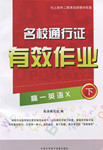题目内容
She dressed down to visit her poor relatives, ________ offend them by a show of her wealth.
A. in order that heB. so that she won’t
C. so as not toD. intending to
练习册系列答案
 名校通行证有效作业系列答案
名校通行证有效作业系列答案
相关题目
题目内容
She dressed down to visit her poor relatives, ________ offend them by a show of her wealth.
A. in order that heB. so that she won’t
C. so as not toD. intending to
 名校通行证有效作业系列答案
名校通行证有效作业系列答案